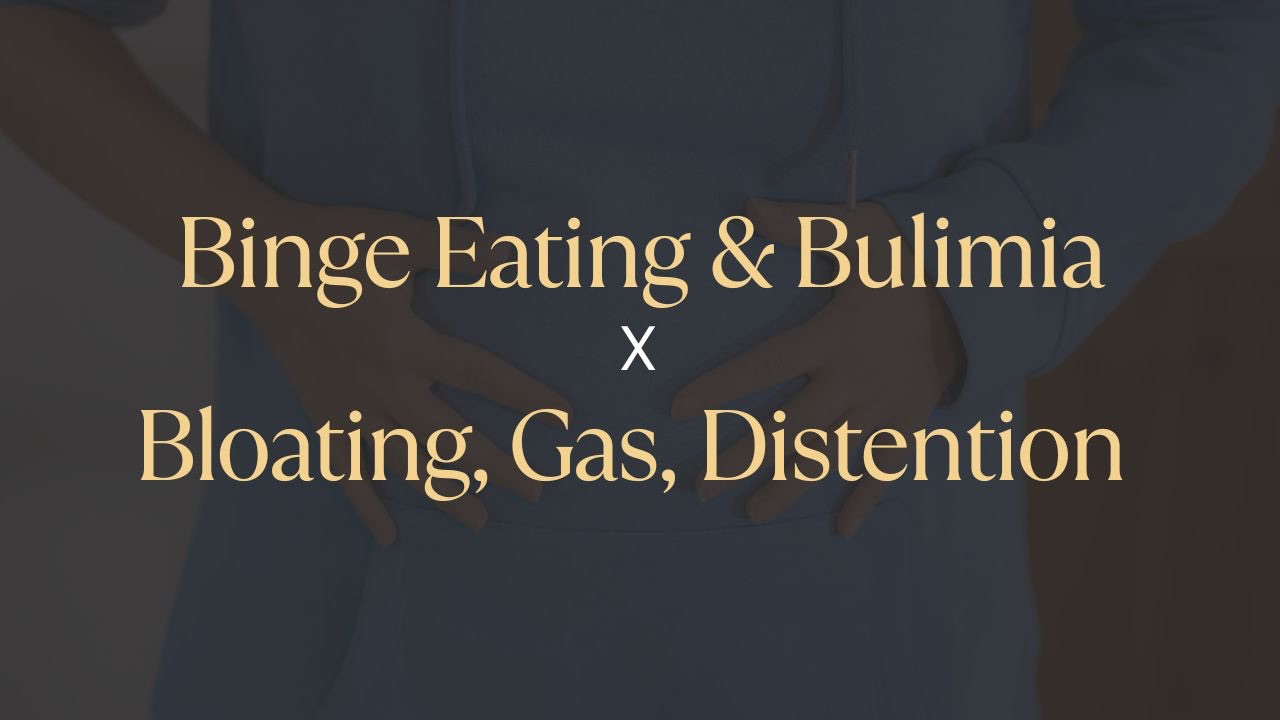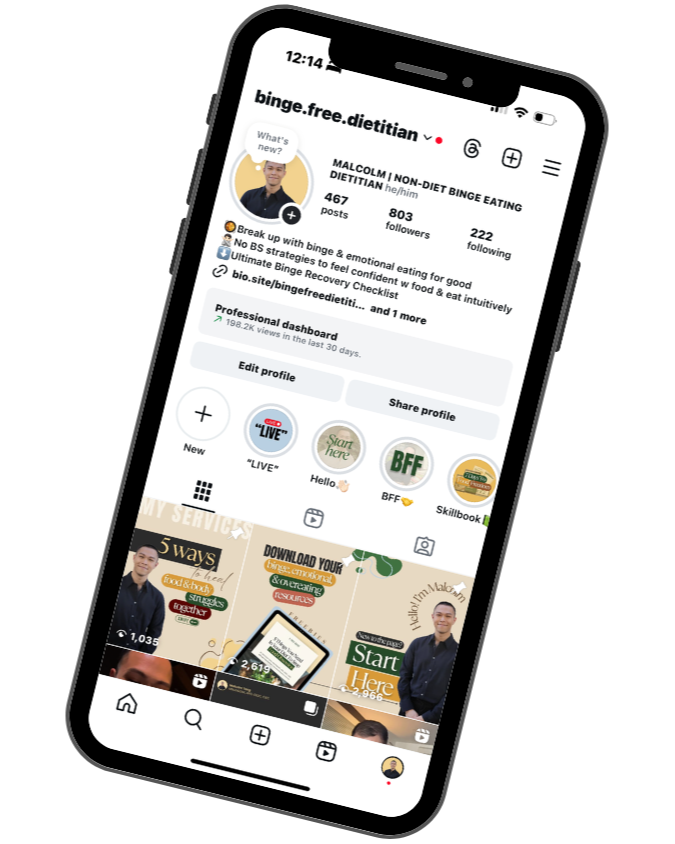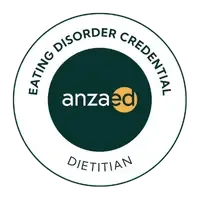Binge Eating and Bloating, Stomach Pain and Distention
Nov 07, 2025
You know that feeling. Your stomach feels like it might explode, you feel like being trapped in a body that's always at war with itself. Every episodes of binge eating brings a mix of relief and regret - followed by a swollen, painful stomach, tight clothes and heavy shame that comes after.
It's not just physical discomfort - it's the exhaustion of feeling out of control, avoiding mirrors. fearing social meals and wondering why foods has such power over you. The cycle of overeating, stomach pain and guilt becomes overwhelming.
Bloating, pain and agdominal distention are incredibly common with binge eating, emotional eating and binge-purge behaviours.
What's Really Going On?
Bloating happens when gas build-up in your gut, you stomach may be physically sticking out, feeling uncomfortable full and sometimes causes pain.
Pre-binge eating bloating
Many people already struggle with bloating before binge eating decided to intrude your life. This is likely due to functional gut disorders e.g. IBS (Irritable Bowel Syndrome), SIBO (Small Intestinal Bacterial Overgrowth) or due to constipation - all of which can makes your guts more sensitive and reactive. It can also developed due to change in gut sensitivity - which could be biological or psychological (will talk more about in the emotion section).
The physical stretch of the stomach
Binge eating often involves a much larger amount of food being consumed in a short period of time - and it can cause the physical discomfort or pain due to the stomach being stretched beyond the usual comfort level. Your stomach can send signal to the brain screaming "full" or even "pain". This can lead to the stomach pain or lead to distention (stomach/belly sticks out).
Digestion slows down
When we binge, especially eating until uncomfortably full can shock our digestive system. The amount of digestion work is large for our body, so the digestion can slow down, the stomach takes longer to empty, the intestines struggle to break down and move food along. This delay can lead to food being fermented and produce gases, which increase the pressure result in the "bloating" and "pain" in belly. Constipation might also be a result of overloaded digestive system, which can make bloating even worse.
Constant grazing
In between our meals, our gut will go on a motion of sweeping material down the intestine which is known as the migrating motor complex (MMC). However, when we constant graze, it leaves no time for the gut to activate the MMC. Many people struggle with binge eating who constantly graze also prevent having a proper sized main meals, which can also prevent MMC being activated. When our gut have no time or no activation of MMC, residual materials in the guts can ferment and lead to gas build up. This can also lead to development of SIBO (small intestinal bacterial overgrowth)
Stress and gut-brain connection
Our gut is called the second brain for a reason, it has a strong communication to our brain, it can feels and be affected by emotions. Chronic stress, which can be caused by food guilt and binge eating shame, can chronically compromise our gut health by altering our gut microbiome balance, gut motility ability and nerve sensitivity. It can show up as a functional gut disorder (meaning there's no structural damage of the gut). The increased gut sensitivity, dysregualted gut-brain communication can make gut more prone to bloating, pain and distention.
The binge-restrict cycle makes everything worse
It's common in our diet cuture filled society to think about "making up" for the binge - restricting, skipping meals, avoiding "bad" foods or even purging to "balance out". However, restriction itself and irregular meals and inadequate food can also alters gut motility, and increase the gut sensitivity, making the bloating, stomach pain and distention sensation stronger and more frequent. The restriction and compensation will also increase the intensity and frequency of future binge eating, becoming a vicious cycle.
The Common Mistakes
When bloating shows up again and again, it’s natural to assume something is wrong with your gut — maybe it’s gluten, dairy, FODMAPs, or even IBS or coeliac disease. Many people start cutting out more and more foods after non-evidence based testing (e.g. IgG gut test from the pharmacy), subsequently trying elimination diets or strict low-FODMAP plans without properly understand the cause and the protocol of these diets.
The problem? These restrictive approaches often backfire. Constantly removing foods can reduce gut microbiome diversity, slow digestion, and heighten fear or anxiety around eating — all of which can worsen bloating in the long run. Adding the binge eating layer - these restriction cycles can make urges even stronger. The more foods you cut out, the more likely your body and brain will rebel later, swinging back into overeating or bingeing.
What Actually Helps?
Instead of chasing a “perfect gut” through restriction, the real solution often lies in retraining the gut-brain connection, nourishing consistently, and building safety with food again — not fear.
That’s where the REVIBE Framework comes in.
REVIBE is a gentle, stepwise approach that focuses on improving gut symptoms before jumping into elimination diets. It recognises that bloating and distention come from many factors — stress, irregular eating, under-fuelling, and gut–brain imbalance — not just specific foods.
Here’s how each step can help your gut and your binge eating recovery work together (instead of against each other)
Rhythm & routine
Establishing predictable, balanced eating pattern that creates stability and provide adequate nutrient for your body and digestion.
For your gut:
Your digestive system thrives on rhythm. Regular, adequate meals keep the gut’s natural “migrating motor complex” functioning, improve motility, and reduce gas and fermentation that lead to bloating. Eating every few hours also nourishes your gut bacteria, keeping the microbiome balanced and well-fed.
For recovery:
Predictable eating stops the restrict–binge cycle in its tracks. When your body knows food is coming, it no longer needs to overeat “just in case.” This consistency builds body trust, reduces chaotic hunger, and signals to your nervous system that it’s finally safe to relax.
Eating mindfully
Bringing awareness and calm to meals so your body can properly digest and your brain can actually register satisfaction.
For your gut:
Rushed or distracted eating can make you swallow air, tense your diaphragm, and disrupt stomach emptying — all of which worsen bloating. Eating slowly, chewing well, and noticing your body’s signals activate your rest-and-digest mode, helping your gut process food with more ease and reduce stress-induced gut symptoms
For recovery:
Mindful eating rebuilds connection to internal cues like hunger, fullness, and satisfaction. Instead of eating on autopilot or guilt, you learn to slow down and respond to your body with curiosity, not control. This supports both digestion and emotional regulation.
Variety of Fibre
Encouraging a mix of plant foods to nourish the gut — without making avoiding certain fibre or loading up a certain fibre like another diet
For your gut:
Different types of fibre (soluble, insoluble, and resistant starch) feed diverse gut bacteria, supporting regularity and reducing discomfort. Variety ensures your gut has all the building blocks it needs to stay balanced and resilient.
For recovery:
This promotes applying "addition" to our food instead of restricting or rigid food rules. It also encourage exploring how your body respond to different types of fibres, which also build the mind body connection that's essential for binge eating recovery.
Irritant load
Beaware of personal gut irritant - use your body response to inform instead of fear or restriction
For your gut:
Excess caffeine, alcohol, fizzy drinks, spicy foods, or certain FODMAP can irritate your gut lining and increase bloating. REVIBE encourages gentle experimentation to identify your own tolerance, including what foods and how much you can tolerate — no moralising, no good-or-bad foods.
For recovery:
Identifying irritant gives clarity - not fear. It uses body reaction to inform what food cause painful feelings and GI symptoms, which can greatly promote Body-Food Choice Congurence without falling into all-or-nothing food rules
Beneficial bacteria
Supporting a healthy gut ecosystem through nourishment rather than deprivation.
For your gut:
Adding specific probiotics (require individual assessment) or prebiotic foods helps balance your gut microbiome, and support smoother digestion. A happy microbiome often means a calmer, less reactive gut.
For recovery:
Unlike traditional straight to elimination approach, this avoided food fears and restricitve food rules, and using helpful food and probiotic supplements to empower your health and choices can help manage gut symptoms without falling back to the binge trap
Elimination diet
Use elimination strategies sparingly, strategically and only when really neccessary or appropriate with reintroduction and professional guidance.
For your gut:
REVIBE framework only recommend elimination strateiges, such as low FODMAP diet or elimination diet, after eliminating all other contributing factors to avoid overshooting and fall into a restrictive food pattern. For someone who struggle with binge eating and emotional eating, it's recommended to avoid using the full low FODMAP approach or elimination diet. Instead, use a professional guided top down approach only testing certain possible triggering foods followed by reintroduction to ensure no unnecessary restriciton lingers.
For recovery:
This careful approach prevents relapse into dieting or bingeing. You approach elimination as an experiment — with curiosity, compassion, and clear boundaries — keeping food freedom and psychological safety front and centre.
Working with a Gastroenterologist + Specialist Dietitian
Working with a gastroenterologist and specialist dietitian is essential in navigating the complex issues.
A gastroenterologist can help rule out and manage underlying conditions that mimic or worsen bloating or distention, e.g. coeliac disease, SIBO, motility issues.
They can perform testing (hydrogen test for lactose and fructose intolerance, blood test, stool analysis or endoscopy if needed) to ensure your symptoms aren't structural or intolerance.
A dietitian trained in both gut health and eating disorder recovery knows how to help you navigate gut symptoms relief using food-freedom principles .
Instead of defaulting to doing elimination diet, we'll:
- Do comprehensive assessment on gut symptoms, eating pattern, food related stress, emotional eating response, body image distress and movements.
- Navigate the parrallel process of binge eating recovery and gut symptoms
- Address nutrient gaps that lead to more symptoms and contribute to binge eating
- Identify non-food factors e.g. stress, sleep, meal timing, meal hygiene, etc. that impact your gut symptoms
- Build a plan to execute elimination strategies without over restricting
- Work with your team to develop a plan that best support both your digestive and behavioural health.
This way, you get both symptom improvement and psychological safety — the key to sustainable healing.
Let's Rewrite Your Story with Food and Your Tummy
💬 If you’re feeling stuck in the cycle of binge eating while also struggle with bloating, stomach pain and distention—know that you don’t have to navigate this alone.
If you're ready for support that honours both your health and your relationship with food, I invite you to work with a specialist dietitian who understands the full picture.
✨ Curious what support might look like for you? EXPLORE OUR SERVICES HERE and let’s find the right fit together.












